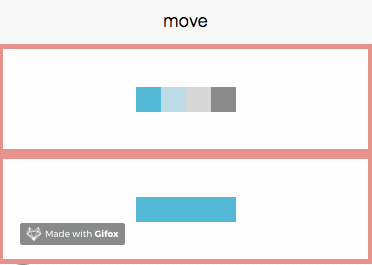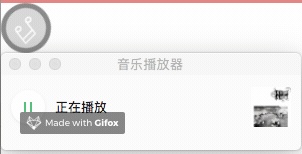在普通的网页开发中,动画效果可以通过css3来实现大部分需求,在小程序开发中同样可以使用 css3 ,同时也可以通过 api 方式来实现。
API解读
小程序中,通过调用 api 来创建动画,需要先创建一个实例对象。这个对象通过 wx.createAnimation 返回, animation 的一系列属性都基于这个实例对象。
创建这个对象
let animation = wx.createAnimation({
duration: 2000,
delay: 0,
timingFunction: "linear",
});
复制代码
这个 animation 就是通过 wx.createAnimation 之后返回的实例。在创建过程中,可以给这个实例添加一些属性,如以上代码所示,等同于 css3 中 animation:$name 2s linear的写法。
添加动效
实例创建完成之后,基于该实例,添加需要的动态效果,动态类型可以查阅文档得知,以最常见的移动,旋转为例:
animation.translate($width, 0).rotate($deg);
复制代码
结束动画
.step() 表示一组动画的结束
animation.step();
复制代码
导出动画
动画效果添加完成了,如何给想要的dom添加动效呢。这里需要用到 .export() 导出动画队列,赋值给某个dom对象。
this.setData({ moveOne: animation.export() })
复制代码
<view animation="{{moveOne}}"></view>
复制代码
例子
以下将通过2组动画,来对比一下 css3 与 api 实现方式的不同。
一、模块移动动画
动画效果:
下图有两组动画,分别为 api 方式(上)与 css3 方式(下)完成的效果,点击move按钮,动画启动。

代码实现
以下分别为 css3 与 api 的核心代码:
css3:
<!-- wxml -->
<view class='border'>
<view class='css-block {{isMove && "one"}}'></view>
<view class='css-block {{isMove && "two"}}'></view>
<view class='css-block {{isMove && "three"}}'></view>
<view class='css-block {{isMove && "four"}}'></view>
</view>
复制代码
// scss
@mixin movePublic($oldLeft,$oldTop,$left,$top) {
from {
transform:translate($oldLeft,$oldTop);
}
to {
transform:translate($left,$top);
}
}
@mixin blockStyle($color,$name) {
background: $color;
animation:$name 2s linear infinite alternate;
}
.one {
@include blockStyle(lightsalmon,onemove);
}
@keyframes onemove {
@include movePublic(50rpx,-25rpx,-150rpx,0rpx);
}
.two {
@include blockStyle(lightblue,twomove);
}
@keyframes twomove {
@include movePublic(0rpx,25rpx,-50rpx,0rpx);
}
.three {
@include blockStyle(lightgray,threemove);
}
@keyframes threemove {
@include movePublic(0rpx,25rpx,50rpx,0rpx);
}
.four {
@include blockStyle(grey,fourmove);
}
@keyframes fourmove {
@include movePublic(-50rpx,-25rpx,150rpx,0rpx);
}
复制代码
// js
moveFunction(){
this.setData({
isMove: true
})
}
复制代码
css3 中通过动态改变 class 类名来达到动画的效果,如上代码通过 one 、 two 、 three、 four 来分别控制移动的距离,通过sass可以避免代码过于冗余的问题。 (纠结如何在小程序中使用 sass 的童鞋请看这里哦: wechat-mina-template )
api:
moveClick(){
this.move(-75,-12.5,25,'moveOne');
this.move(-25,12.5, 0,'moveTwo');
this.move(25, 12.5,0,'moveThree');
this.move(75, -12.5,-25,'moveFour');
this.moveFunction(); // 该事件触发css3模块进行移动
},
// 模块移动方法
move: function (w,h,m,ele) {
let self = this;
let moveFunc = function () {
let animation = wx.createAnimation({
duration: 2000,
delay: 0,
timingFunction: "linear",
});
animation.translate(w, 0).step()
self.setData({ [ele]: animation.export() })
let timeout = setTimeout(function () {
animation.translate(m, h).step();
self.setData({
// [ele] 代表需要绑定动画的数组对象
[ele]: animation.export()
})
}.bind(this), 2000)
}
moveFunc();
let interval = setInterval(moveFunc,4000)
}
复制代码
效果图可见,模块之间都是简单的移动,可以将他们的运动变化写成一个公共的事件,通过向事件传值,来移动到不同的位置。其中的参数 w,h,m,ele 分别表示发散水平方向移动的距离、聚拢时垂直方向、水平方向的距离以及需要修改 animationData 的对象。
通过这种方法产生的动画,无法按照原有轨迹收回,所以在事件之后设置了定时器,定义在执行动画2s之后,执行另一个动画。同时 动画只能执行一次 ,如果需要循环的动效,要在外层包裹一个重复执行的定时器到。
查看源码,发现 api 方式是通过 js 插入并改变内联样式来达到动画效果,下面这张动图可以清晰地看出样式变化。

打印出赋值的 animationData , animates 中存放了动画事件的类型及参数; options 中存放的是此次动画的配置选项, transition 中存放的是 wx.createAnimation 调用时的配置, transformOrigin 是默认配置,意为以对象的中心为起点开始执行动画,也可在 wx.createAnimation时进行配置。

二、音乐播放动画
上面的模块移动动画不涉及逻辑交互,因此新尝试了一个音乐播放动画,该动画需要实现暂停、继续的效果。
动画效果:

两组不同的动画效果对比,分别为 api (上)实现与 css3 实现(下):

代码实现
以下分别是 css3 实现与 api 实现的核心代码:
css3:
<!-- wxml -->
<view class='music musicTwo musicRotate {{playTwo ? " ": "musicPaused"}} ' bindtap='playTwo'>
<text class="iconfont has-music" wx:if="{{playTwo}}"></text>
<text class="iconfont no-music" wx:if="{{!playTwo}}"></text>
</view>
复制代码
// scss
.musicRotate{
animation: rotate 3s linear infinite;
}
@keyframes rotate{
from{
transform: rotate(0deg)
}
to{
transform: rotate(359deg)
}
}
.musicPaused{
animation-play-state: paused;
}
复制代码
// js
playTwo(){
this.setData({
playTwo: !this.data.playTwo
},()=>{
let back = this.data.backgroundAudioManager;
if(this.data.playTwo){
back.play();
} else {
back.pause();
}
})
}
复制代码
通过 playTwo 这个属性来判断是否暂停,并控制 css 类的添加与删除。当为 false时,添加 .musicPaused 类,动画暂停。
api:
<!-- wxml -->
<view class='music' bindtap='play' animation="{{play && musicRotate}}">
<text class="iconfont has-music" wx:if="{{play}}"></text>
<text class="iconfont no-music" wx:if="{{!play}}"></text>
</view>
复制代码
// js
play(){
this.setData({
play: !this.data.play
},()=>{
let back = this.data.backgroundAudioManager;
if (!this.data.play) {
back.pause();
// 跨事件清除定时器
clearInterval(this.data.rotateInterval);
} else {
back.play();
// 继续旋转,this.data.i记录了旋转的程度
this.musicRotate(this.data.i);
}
})
},
musicRotate(i){
let self = this;
let rotateFuc = function(){
i++;
self.setData({
i:i++
});
let animation = wx.createAnimation({
duration: 1000,
delay: 0,
timingFunction: "linear",
});
animation.rotate(30*(i++)).step()
self.setData({ musicRotate: animation.export() });
}
rotateFuc();
let rotateInterval = setInterval(
rotateFuc,1000
);
// 全局定时事件
this.setData({
rotateInterval: rotateInterval
})
}
复制代码
通过 api 实现的方式是通过移除 animationData 来控制动画,同时暂停动画也需要清除定时器,由于清除定时器需要跨事件进行操作,所以定了一个全局方法 rotateInterval。
api 方式定义了旋转的角度,但旋转到该角度之后便会停止,如果需要实现重复旋转效果,需要通过定时器来完成。因此定义了变量i,定时器每执行一次便加1,相当于每1s旋转30°,对 animation.rotate() 中的度数动态赋值。暂停之后继续动画,需要从原有角度继续旋转,因此变量i需要为全局变量。
代码变化
下图可以看出, api 方式旋转是通过不断累加角度来完成,而非 css3 中循环执行。

对比
通过上述两个小例子对比,无论是便捷度还是代码量,通过 css3 来实现动画效果相对来说是更好的选择。 api 方式存在较多局限性:
- 动画只能执行一次,循环效果需要通过定时器完成。
- 无法按照原有轨迹返回,需要返回必须定义定时器。
- 频繁借助定时器在性能上有硬伤。
综合以上,推荐通过 css3 来完成动画效果。
本文发布于薄荷前端周刊,欢迎Watch & Star ★